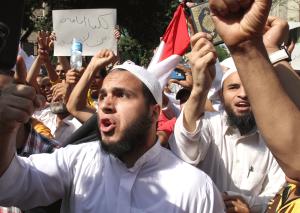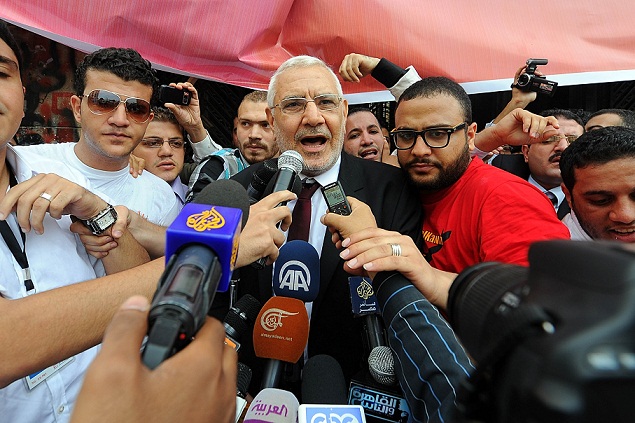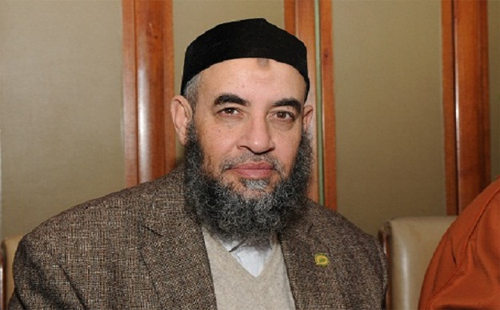
(AFP FILE PHOTO)
The Building and Development Party, the political wing of Al-Jamaa Al-Islamiya, a militant group that has renounced violence, announced on Sunday that it will not participate in the protests called by the Salafi Front to stage an “Islamic Uprising” on 28 November.
The Islamist political organisation Salafi Front has called for mass protests, which it called “the Muslim Youth Uprising”, in response to what it described as “secular attempts to weaken and destroy the Islamic identity and Sharia”.
Building and Development Party leader Essam Derbala said that the calls are problematic because “they focus on [Islamic] identity and Sharia Law, more than consensus,” adding that that the calls contradict Sharia, which asks Muslims to cooperate and unite.
“Calling for an Islamic Revolution will only create division among the members of Islamist movements and will increase tensions between Islamists and non-Islamists. Moreover, it will lead to violence and a crackdown by the state,” said Derbala in a statement published on the party’s website.
“Those who called for these protests must revise their position and ally with other revolutionary forces in the country,” Derbala added.
During the 1980s and 1990s Al-Jamaa Al-Islamiyawas involved in an insurgency against the Egyptian state, which left hundreds of civilians and security personnel dead. In 1996, the group underwent significant changes and revised many of the core tenets of its ideology, vowing to focus on charity and peaceful proselytising.
The group’s political wing, the Building and Development Party, was launched after the 25 January Revolution and some of its members were elected in the 2011 parliamentary elections. They eventually became strong supporters of Islamist former president Mohamed Morsi. After Morsi’s ouster the party joined the Anti-Coup Alliance (ACA), opposing the post-30 June governments.
Tarek al-Zumar, secretary-general of the party, told the Qatar-based Al Jazeera channel, which is often accused of pro-Muslim Brotherhood bias and of opposing the current Egyptian regime, that any calls for violence by any Islamist movement will “be a justification by the coup government to practice excessive violence against protesters”.
Meanwhile, the Al-Wasat party announced on Sunday it will not take part in the protests scheduled on 28 November. The party’s spokesperson Mohamed Abdellatif said that “we agree on the objectives of the 25 January protests and we believe that calls for the Muslim Youth Uprising will create division among people”.
Al-Wasat was a member of the ACA, but withdrew from the alliance last August.
The party emphasised the need to work outside the alliance’s framework to “establish an inclusive alliance”, adding that this would act as an umbrella to resist the current “tyrannical rule” and to achieve the goals of the 25 January Revolution.
The president of the party and the vice president were arrested after the ouster of Morsi on charges of “inciting violence and insulting the judiciary”.
Al Watan, a Salafist party, also criticised the Salafi Front’s calls, accusing them of “calling for violent confrontations”, according to state media.
The party’s president, Youssry Hamed, said that “although many people think revolution is the only method to solve the current political turmoil, we have to find an inclusive and unconditional solution to the current situation”.
The party also withdrew from the ACA, based on “the need to ensure national reconciliation and a successful transition and to end all disputes in the political scene”.
Al-Nour Party, the political arm of Egypt’s Salafist Call, has been mobilising in several governorates organising popular conferences to convince people not to participate in the 28 November protests.
Al-Nour condemned the calls by the Salafi Front, adding that such declarations are based on “takfiri ideology” and constitute a call for overthrowing the government and the constitution.
The Syndicate of the Sufi Orders said on Thursday that they “refused all sorts of terrorism and denounced the Salafi Front calls for protesting with copies of the Holy Quran on 28 November 28”.
Both the Al-Azhar religious institution and the Ministry of Religious Endowment described the calls as an “invitation for civil strife and treason to the homeland”, while describing the Salafi Front as “Kharijites”.
Kharijites is a term used by Islamic scholars to describe groups who go against religious leaders or traditional religious institutions. The term originated in the 8th century in Arabia, when it was used to refer to Muslims who rejected the leadership of the Caliph Ali ibn Abi Talib.
On the other hand, a number Islamist parties and groups have pledged support for the anticipated “uprising”, citing a variety of reasons.
Mohamed Fathy, head of Al-Fadila Party, said on his official page that the party will be participating in the uprising, stating that “the new wave of protests is an escalation of revolutionary mobilisation against the current government”.
He added that the protests should exceed the level of confrontation which took place on the 28 January, and “should continue for days of revolutionary confrontation with new methods”.
“The coup used all types of violence against us. We should confront these violations,” Fathy said.
Al-Fadila Party was established by Salafi activists, scholars, and professional after the 25 January revolution to spread the values of justice and equality and to bring Egypt back to a position of leadership”.
Under the interim rule of the Supreme Council of Armed Forces (SCAF) following the 2011 revolution, the party refused any confrontation with the armed forces, arguing that the “objectives of the revolution” had been achieved.
Similarly, Al-Tahrir Salafist Party released a statement on its official website calling on the Muslim youth to carry out the promised uprising in an “attempt to restore the holy caliphate”. The party added that “during the current situation thousands are thrown in jail, and mosques are prevented from calling for establishing the caliphate. Hence, we see that calls to protest on 28 November are a fruitful invitation to radically change the system, which the US created to separate revolutionary rhetoric from Islam”.
“The masses on the streets should acknowledge that their lives are for Islam. Without it, life would be worthless”.
However, the party added that calls to establish the caliphate and remove the military from the political scene should not aim to destroy the army, as “the army is the most efficient tool to lead the struggle of Islam, Muslims, and proselytising. It is the only organisation capable of fighting the enemies of Islam”.
The party was originally founded in 1953 in Jerusalem, with the main objective of restoring the Islamic caliphate, through political and ideological confrontation. The party never participated in any elections, as it believes that democracy and capitalism contradict Islam.
Another Salafist party, Al-Raya, announced it will participate in the 28 November protests, calling for the return of legitimacy and the fall of “military rule”. The party was formed by Egyptian lawyer and Salafi Islamist politician Hazem Salah Abu Ismail.
A former presidential candidate, Abu Ismail was a vocal opponent of SCAF in 2011 and 2012, and is now serving a seven years sentence for forging documents related to his mother’s nationality.
The Muslim Brotherhood, which has been designated as a terrorist organisation by the authorities, called the 28 November protests a “new wave of the glorious Egyptian revolution,” and urged other groups to fight for their identity.
“We are warning the bloody coup regime not to commit any violations against our innocent youth, or destroy mosques, or burn the holy Quran,” the Brotherhood’s statement added. It also said it will stand by the Egyptians until they accomplish the goals of the 25 January Revolution.
However, the Brotherhood fell short of announcing that its supporters should physically participate in the protests.
The Salafi Front has been mobilising for “The Muslim Youth Uprising” since the end of October “to defy those who authorised the murder of Muslim youth in the streets, the arrest of tens of thousands, and closure of mosques”.
The conservative group, which supported ousted Islamist president Mohamed Morsi, called for an Islamic revolution “that reveals the conspiracies of secularism, to defend Islamic identity and demand justice”.
The Minister of Interior Mohamed Ibrahim recently stated that police special forces will be present in large numbers in streets and public squares in anticipation of any attacks on police facilities. A spokesman for the ministry had earlier said that any threat to police facilities “will be met with force and if necessary with live rounds”.

